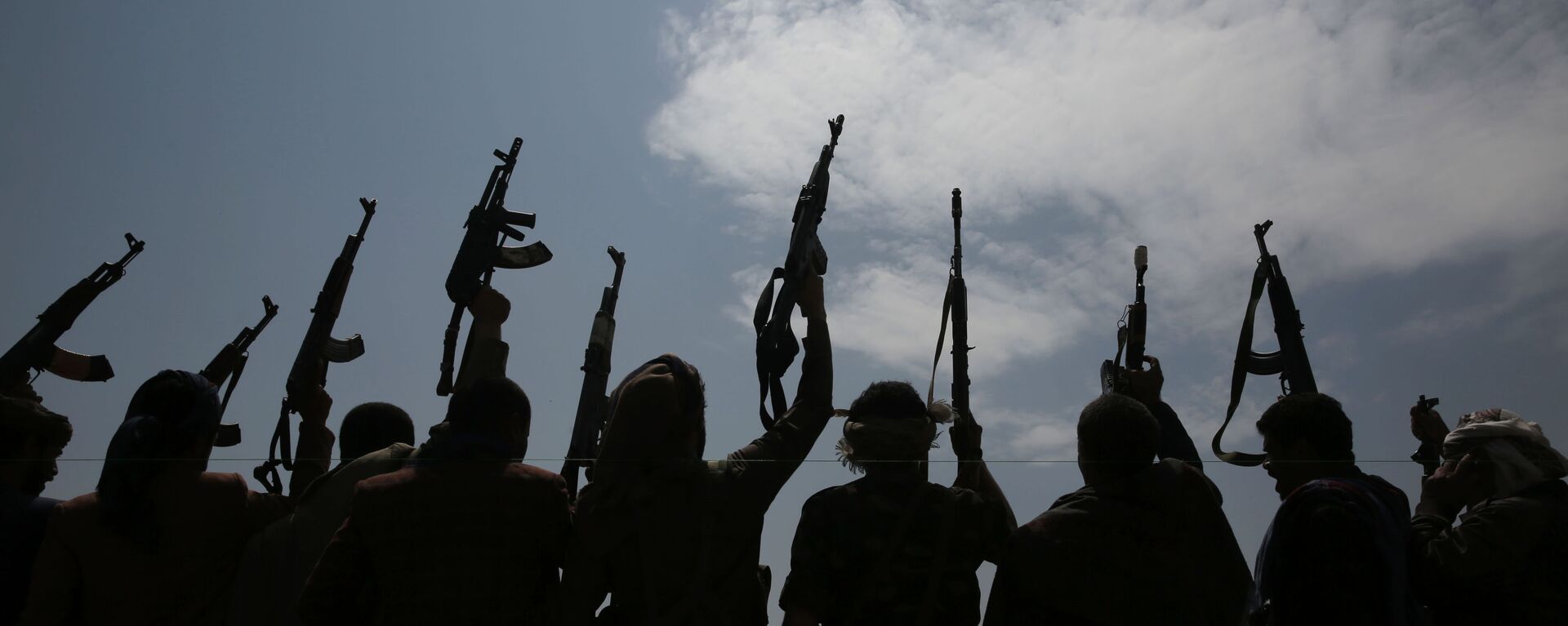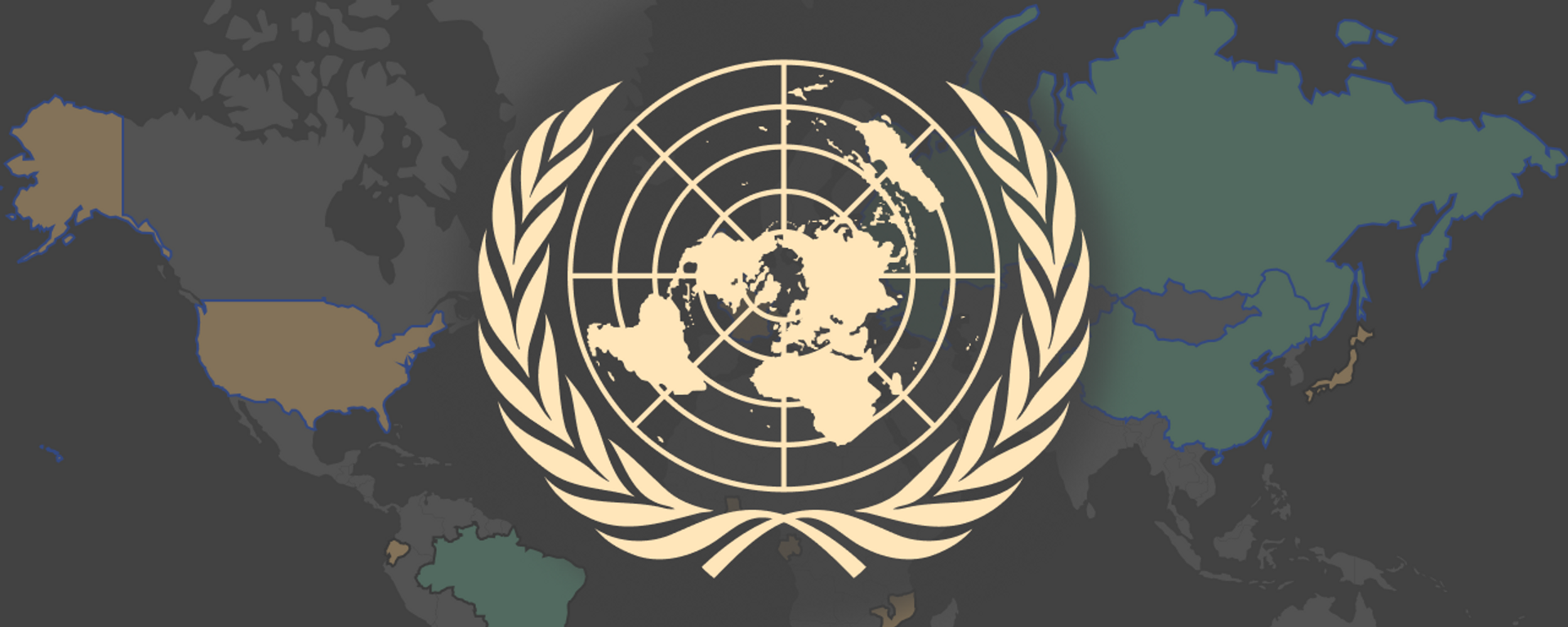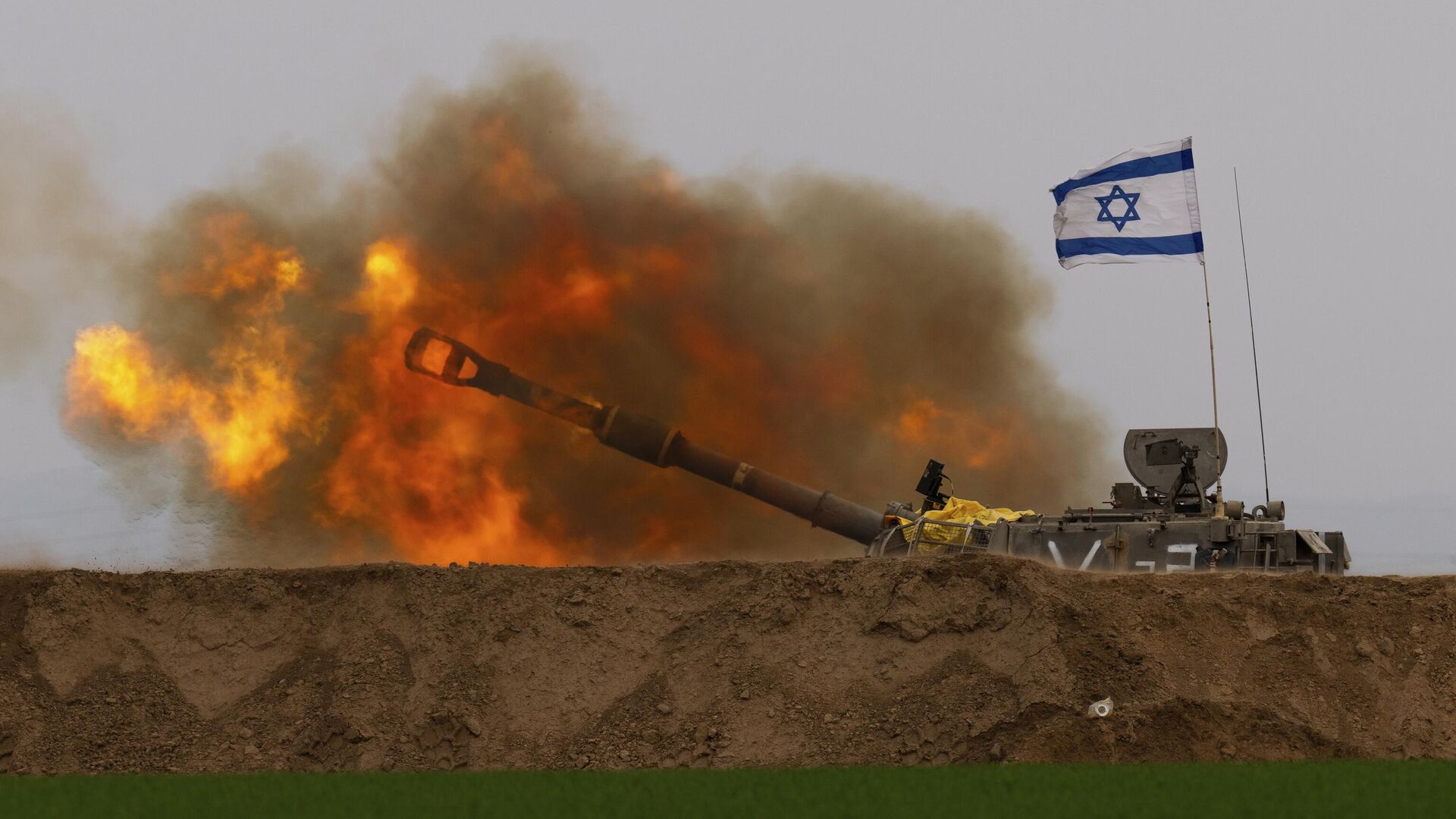https://sputnikglobe.com/20231222/afghanistan-offers-lessons-in-regime-change-to-israel-in-gaza-1115758737.html
Afghanistan Offers Lessons in Regime Change to Israel in Gaza
Afghanistan Offers Lessons in Regime Change to Israel in Gaza
Sputnik International
History is repeating itself in Gaza. A devastating surprise terrorist attack by Islamist extremists has again been followed by a ground invasion. Now the post-war scenario is being considered.
2023-12-22T23:11+0000
2023-12-22T23:11+0000
2023-12-22T23:08+0000
analysis
opinion
afghanistan
palestine-israel conflict
hamas
iraq
democracy
post-war
https://cdn1.img.sputnikglobe.com/img/07e7/0c/15/1115732548_0:160:3072:1888_1920x0_80_0_0_93afb7673b2957ce88a2918cf3ee8c13.jpg
“America will build roads, schools, buildings, everything.” “Now Afghanistan will be beautiful.” “We will have freedom! We will choose our new government.”And after that? I asked. What will the US do? “They will leave,” people told me.If only things were that simple, I remember thinking.History is repeating itself in Gaza. A devastating surprise terrorist attack by Islamist extremists has again been followed by a ground invasion. Now the post-war scenario is being considered. It’ll either be the full-fledged ethnic cleansing centered around the expulsion of Gazans, or regime change. Israel will have the victorious army, control over 2.3 million people (minus the 100,000 or 200,000 it will have killed) and it will soon face some of the same high expectations for reconstruction and the establishment of a post-Hamas government as the US contended with after defeating the Taliban in 2001.What form would a post-Hamas Gazan government take? America’s approach to post-Taliban Afghanistan should serve as a case study of what Israel should not do if and when it topples Hamas. After the US orchestrated the presidency of Hamid Karzai, he and his successor Ashraf Ghani were consistently viewed as weak and corrupt puppets installed by exploitative foreigners. Two decades, two thousand soldiers and two trillion dollars later, the US found itself where it started, with the Taliban back in charge.The seeds of America’s humiliating withdrawal from Kabul in August 2021 were planted by a few disastrous decisions by the Bush administration in the months immediately following the collapse of the first Taliban regime in December 2001.The Americans’ first major mistake took place at the Bonn Conference in November 2001, where they allowed the Tajik-dominated Northern Alliance the highest number of delegates. The Northern Alliance was America’s ally in its war against the Taliban, but it only enjoyed the support of a tiny minority of Afghans, mostly in the remote mountainous northeast of the country and was the fervent enemy of the nation’s Pashtun majority. Accountable only to their American patrons, the Northern Alliance threw restraint to the wind, appointing warlords reputed for violence and corruption to cabinet positions and provincial governorships.Members of the Taliban, whose government had controlled more than 90% of the country’s territory before 9/11, were excluded from public life under a misbegotten policy of “detalibanization.” Many fled across the Hindu Kush mountains to Pakistan as a result, biding their time as they organized Taliban 2.0.Though telegenic and charismatic, Karzai—the man elected at Bonn as chairman of Afghanistan’s interim government—could not have been a worse choice. Though sold by the Tajiks leading the regime as a sop to his fellow Pashtuns, his close ties to the CIA and the fact that he had been living in exile on 9/11 added to the suspicion among Afghans that he had been parachuted in to serve as the country’s Philippe Pétain.A traditional loya jirga tribal council convened in June 2002 in order to choose a permanent leader. Once again, the Taliban—by far the biggest ideological cohort—were excluded.Making matters worse, Washington refused to let democracy, or Afghanistan’s traditional form of representative democracy, decide the future. When the exiled king, Mohammed Zahir Shah, emerged as an early frontrunner as the figurehead of a potential unity coalition, the US panicked. Envoy Zalmay Khalilzad clumsily buttonholed him behind the scenes until the humiliated former monarch agreed to withdraw from the race and endorse Bush’s choice, Karzai—at a US-held press conference. The US-backed Afghan government committed countless errors over its ensuing 19 years in power. Regardless of its performance, however, it never stood a chance of being considered legitimate after such dismal origins.Like an individual, a regime only has one chance to make a good first impression. The Afghan debacle teaches Israel two important lessons about regime change, should it choose to impose a government upon Gaza. First, disenfranchising a substantial segment of the population will hobble Gaza’s next leadership, no matter how well-intentioned or democratic the process otherwise appears to be. Dehamasification would be as much of a disaster as detalibanization and debaathification in Iraq.The other lesson is the most important: a democracy in which outsiders keep their thumb on the scale is an oxymoron. If—which I seriously doubt—Israel seeks to spread democracy to the occupied territories, it must let it play out organically and abide by the results no matter what—especially if they’re disagreeable.(Ted Rall (Twitter: @tedrall), the political cartoonist, columnist and graphic novelist, co-hosts the left-vs-right DMZ America podcast with fellow cartoonist Scott Stantis. You can support Ted’s hard-hitting political cartoons and columns and see his work first by sponsoring his work on Patreon.)
https://sputnikglobe.com/20231220/journo-us-israel-in-quagmire-as-yemen-expands-gaza-war-into-regional-conflict-1115707682.html
https://sputnikglobe.com/20231222/unsc-adopts-resolution-appointing-humanitarian-coordinator-to-facilitate-aid-into-gaza-1115754442.html
afghanistan
iraq
Sputnik International
feedback@sputniknews.com
+74956456601
MIA „Rossiya Segodnya“
2023
Ted Rall
https://cdn1.img.sputnikglobe.com/img/07e5/02/13/1082125340_0:0:360:360_100x100_80_0_0_1ed1a3494a53cde87e19521c3658fe92.jpg
Ted Rall
https://cdn1.img.sputnikglobe.com/img/07e5/02/13/1082125340_0:0:360:360_100x100_80_0_0_1ed1a3494a53cde87e19521c3658fe92.jpg
News
en_EN
Sputnik International
feedback@sputniknews.com
+74956456601
MIA „Rossiya Segodnya“
Sputnik International
feedback@sputniknews.com
+74956456601
MIA „Rossiya Segodnya“
Ted Rall
https://cdn1.img.sputnikglobe.com/img/07e5/02/13/1082125340_0:0:360:360_100x100_80_0_0_1ed1a3494a53cde87e19521c3658fe92.jpg
what will post-war gaza look like, who will govern gaza after conflict, palestine-israel conflict,
what will post-war gaza look like, who will govern gaza after conflict, palestine-israel conflict,
Afghanistan Offers Lessons in Regime Change to Israel in Gaza
I talked to a lot of people in Afghanistan, where I reported about the fall 2001 US invasion. Young or old, urban or rural, no matter their ethnicity, they all expected the victors to work miracles after the Taliban’s defeat.
“America will build roads, schools, buildings, everything.” “Now Afghanistan will be beautiful.” “We will have freedom! We will choose our new government.”
And after that? I asked. What will the US do? “They will leave,” people told me.
If only things were that simple, I remember thinking.
History is repeating itself in Gaza. A devastating surprise terrorist attack by Islamist extremists has again been followed by a ground invasion. Now the post-war scenario is being considered. It’ll either be the full-fledged ethnic cleansing centered around the expulsion of Gazans, or
regime change. Israel will have the victorious army, control over 2.3 million people (minus the 100,000 or 200,000 it will have killed) and it will soon face some of the same high expectations for reconstruction and the establishment of a post-Hamas government as the US contended with after defeating the Taliban in 2001.
What form would a post-Hamas Gazan government take?
“It might entail greater control for the Palestinian National Authority based in Ramallah, some sort of new local governance, governance under the tutelage of the Israeli military, or perhaps a coalition of Arab states,” Jon B. Alterman of the
Center for Strategic and International Studies speculated at the start of the war.
America’s approach to post-Taliban Afghanistan should serve as a case study of what Israel should
not do if and when it topples Hamas. After the US orchestrated the presidency of Hamid Karzai, he and his successor Ashraf Ghani were consistently viewed as weak and corrupt puppets installed by exploitative foreigners. Two decades, two thousand soldiers and
two trillion dollars later, the US found itself where it started, with the Taliban back in charge.
The seeds of America’s humiliating withdrawal from Kabul in August 2021 were planted by a few disastrous decisions by the Bush administration in the months immediately following the collapse of the first Taliban regime in December 2001.

20 December 2023, 17:40 GMT
The Americans’ first major mistake took place at the
Bonn Conference in November 2001, where they allowed the Tajik-dominated Northern Alliance the highest number of delegates. The Northern Alliance was America’s ally in its war against the Taliban, but it only enjoyed the support of a tiny minority of Afghans, mostly in the remote mountainous northeast of the country and was the fervent enemy of the nation’s Pashtun majority. Accountable only to their American patrons, the Northern Alliance threw restraint to the wind, appointing warlords reputed for violence and corruption to cabinet positions and provincial governorships.
Members of the Taliban, whose government had controlled more than 90% of the country’s territory before 9/11, were excluded from public life under a misbegotten policy of “detalibanization.” Many fled across the Hindu Kush mountains to Pakistan as a result, biding their time as they organized Taliban 2.0.
Though telegenic and charismatic, Karzai—the man elected at Bonn as chairman of Afghanistan’s interim government—could not have been a worse choice. Though sold by the Tajiks leading the regime as a sop to his fellow Pashtuns, his
close ties to the CIA and the fact that he had been living in exile on 9/11 added to the suspicion among Afghans that he had been parachuted in to serve as the country’s Philippe Pétain.
A traditional loya jirga tribal council convened in June 2002 in order to choose a permanent leader. Once again, the Taliban—by far the biggest ideological cohort—were excluded.
Making matters worse, Washington refused to let democracy, or Afghanistan’s traditional form of representative democracy, decide the future.

22 December 2023, 17:43 GMT
When the exiled king, Mohammed Zahir Shah, emerged as an early frontrunner as the figurehead of a potential unity coalition, the US panicked. Envoy Zalmay Khalilzad clumsily buttonholed him behind the scenes until the humiliated former monarch
agreed to withdraw from the race and endorse Bush’s choice, Karzai—at a US-held press conference.
“Together, these actions convinced many that the loya jirga is a puppet of [Northern Alliance] Panjshiris and foreigners, and that the Bush administration is not willing to let Afghans engage in any democratic debate that might contradict American views,” S. Frederick Starr and Marin J. Strmecki wrote in The New York Times on June 14, 2002.
The US-backed Afghan government committed countless errors over its ensuing 19 years in power. Regardless of its performance, however, it never stood a chance of being considered legitimate after such dismal origins.
Like an individual, a regime only has one chance to make a good first impression. The Afghan debacle teaches Israel two important lessons about regime change, should it choose to impose a government upon Gaza. First, disenfranchising a substantial segment of the population will hobble Gaza’s next leadership, no matter how well-intentioned or democratic the process otherwise appears to be. Dehamasification would be as much of a disaster as detalibanization and debaathification in Iraq.
The other lesson is the most important: a democracy in which outsiders keep their thumb on the scale is an oxymoron. If—which I seriously doubt—Israel seeks to spread democracy to the occupied territories, it must let it play out organically and abide by the results no matter what—especially if they’re disagreeable.
(Ted Rall (Twitter: @tedrall), the political cartoonist, columnist and graphic novelist, co-hosts the left-vs-right DMZ America podcast with fellow cartoonist Scott Stantis. You can support Ted’s hard-hitting political cartoons and columns and see his work first by sponsoring his work on Patreon.) 




